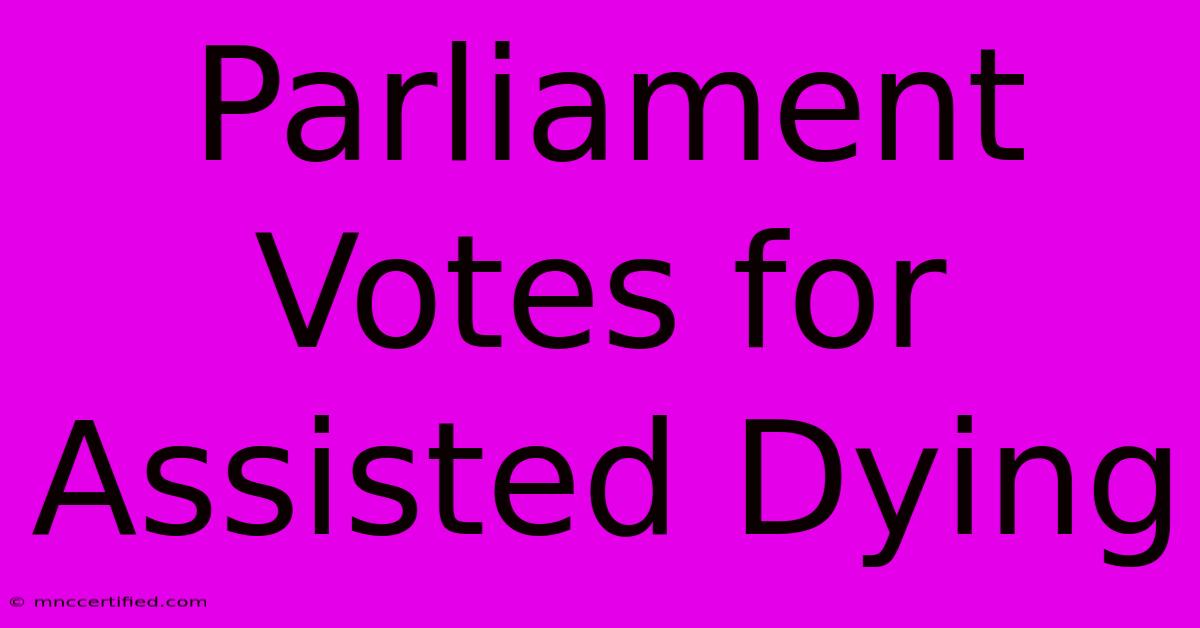Parliament Votes For Assisted Dying

Table of Contents
Parliament Votes for Assisted Dying: A Landmark Shift in End-of-Life Care
The recent vote in Parliament on assisted dying marks a significant turning point in the debate surrounding end-of-life care. This complex issue, fraught with ethical and moral considerations, has finally seen a shift in legislative landscape, with implications that will resonate throughout society for years to come. This article will delve into the details of the vote, exploring the arguments for and against assisted dying, and examining the potential consequences of this landmark decision.
The Details of the Vote: A Closer Look
The parliamentary vote on assisted dying was far from straightforward. Numerous amendments and intense debate preceded the final decision. Key aspects to consider include:
- The specific criteria: The legislation likely outlines strict eligibility criteria for assisted dying, such as terminal illness prognosis, capacity to make informed decisions, and safeguards against coercion. Understanding these specifics is vital to grasping the scope of the new law.
- Conscientious objection: The act likely includes provisions for healthcare professionals who object to participating in assisted dying on moral or religious grounds. These clauses are crucial in addressing the concerns of those who oppose the practice.
- Regional variations: Depending on the parliamentary system, the legislation's implementation might vary across different regions or jurisdictions within the country. This could lead to inconsistencies in access to assisted dying depending on geographical location.
- Review mechanisms: The legislation likely includes a process for regular review and potential amendment, acknowledging the evolving nature of the debate and the need for ongoing evaluation of its impact.
Arguments For and Against Assisted Dying
The debate surrounding assisted dying is deeply emotional and ethically charged. Proponents and opponents hold strongly held beliefs, often rooted in different philosophical and religious perspectives.
Arguments in favor often center on:
- Autonomy and self-determination: Individuals should have the right to control the manner of their death, especially when facing unbearable suffering.
- Compassion and dignity: Assisted dying can offer a compassionate and dignified alternative to prolonged suffering in the final stages of life.
- Relief from unbearable pain: For individuals with incurable and agonizing conditions, assisted dying can provide a means to escape intractable pain and suffering.
Conversely, arguments against assisted dying often focus on:
- The sanctity of life: Human life is inherently valuable and should be protected at all costs, regardless of suffering.
- Potential for abuse and coercion: Concerns exist that vulnerable individuals might be pressured into choosing assisted dying against their true wishes.
- Slippery slope arguments: Opponents worry that legalizing assisted dying could lead to a gradual expansion of its application, potentially encompassing individuals who are not terminally ill.
The Wider Implications: A Societal Shift
This parliamentary vote signifies more than just a change in law; it represents a significant shift in societal attitudes toward death and dying. The implications are far-reaching:
- Increased public discourse: The vote will undoubtedly fuel further public discussion and debate on the ethical and practical aspects of assisted dying.
- Impact on healthcare systems: Healthcare professionals will need to adapt to the new legal framework, requiring training and support in navigating the complex ethical considerations.
- Support networks and palliative care: The implementation of assisted dying legislation necessitates robust support networks and access to high-quality palliative care to ensure that individuals have adequate options for pain management and end-of-life support.
Looking Ahead: Challenges and Opportunities
While the passage of assisted dying legislation is a momentous occasion, it also presents numerous challenges. Ensuring the ethical and safe implementation of the law is paramount. This requires:
- Strict regulation and oversight: Robust regulatory mechanisms are necessary to prevent abuse and ensure compliance with the eligibility criteria.
- Comprehensive education and training: Healthcare professionals need appropriate training to understand and implement the law effectively and ethically.
- Ongoing monitoring and evaluation: Regular review and evaluation of the legislation's impact are essential to identify any unintended consequences and make necessary adjustments.
The Parliament's vote on assisted dying marks a significant moment in the ongoing conversation about end-of-life choices. While challenges remain, this decision opens a new chapter in how society approaches death and dying, prioritizing individual autonomy and compassionate care in the face of terminal illness. The long-term effects of this legislation will be closely watched and debated for years to come.

Thank you for visiting our website wich cover about Parliament Votes For Assisted Dying. We hope the information provided has been useful to you. Feel free to contact us if you have any questions or need further assistance. See you next time and dont miss to bookmark.
Featured Posts
-
Three Games To Shape The Cfp
Nov 30, 2024
-
Badgers Dominated Wisconsin Vs Minnesota Recap
Nov 30, 2024
-
Black Friday 2024 35 Game Deals
Nov 30, 2024
-
Watch College Football Clinching Games
Nov 30, 2024
-
Best Air Pods Black Friday Deals 2024
Nov 30, 2024